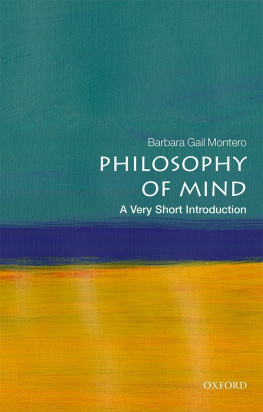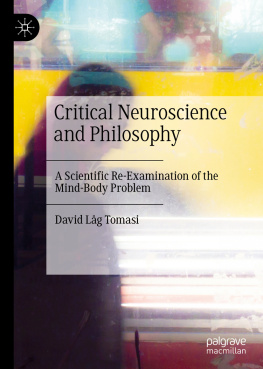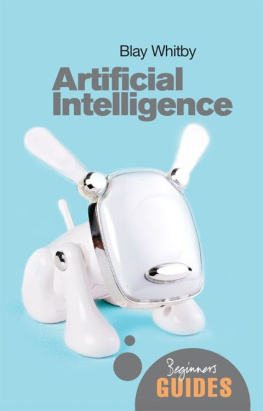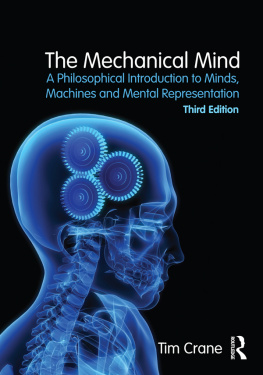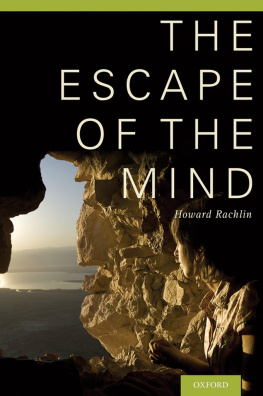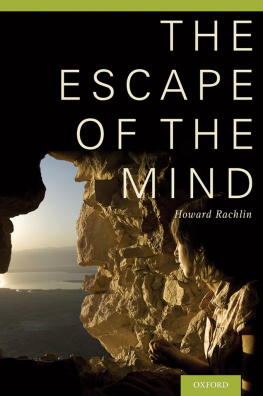How to
Make a Mind
How to
Make a Mind
by
Roger Kingdon

Dedication
In memory of Peternel McLean
Perfect
Copyright Roger Kingdon 2015
The right of Roger Kingdon to be identified as the author of this work has been asserted in accordance with the Copyright, Designs & Patents Act 1988.
All rights reserved. No part of this book may be reproduced, stored in a retrieval system, or transmitted in any form or by any means, electronic, electrostatic, magnetic tape, mechanical, photocopying, recording or otherwise, without the written permission of the copyright holder.
Published under licence by Brown Dog Books and The Self-Publishing Partnership,
7 Green Park Station, Bath BA1 1JB
www.selfpublishingpartnership.co.uk
ISBN printed book: 978-1-78545-060-0
ISBN e-book: 978-1-78545-061-7
Cover design by Kevin Rylands
Printed and bound by CPI Group (UK) Ltd, Croydon CR0 4YY
Contents
7. No new thing under the sun
1.
Introductions
About this book
This book tells you how to make a mind. By you I mean anyone with a reasonable grasp of the written word not just subject-matter experts. By make I mean any or all of create, construct, develop, facilitate, empower. By a mind capable of processing information and generating responses such that the robots observable actions and behaviours are indistinguishable from those of a healthy mature human being when exposed to the same conditions and events.
To be more specific, this book sets out the architecture such that properties and processes can be ascribed only to the collective system as a whole, and not to any one constituent agent operating alone. And, since it is as emergent phenomena that the various aspects of the mind are manifested in humans, this becomes the primary reason for using a multi-agent system to control a robot.
The central claim of this book is that if a robot is equipped with the proposed control system, and if it is nurtured in a secure and stable learning environment similar to that experienced by a person throughout his or her development from birth to maturity, then in due course it will exhibit precisely those traits that we associate with the human mind, including consciousness, self-awareness, free will, forethought, originality, adaptability, language comprehension, communication skills, emotional awareness, social engagement, and a level of physical coordination and expression that is finely-tuned to the features and limitations of the human body. This is an ambitious claim: outrageous, even. I would not expect anyone to accept it without question. Accordingly, the bulk of this book is taken up with the various observations and arguments that have led to the formulation of this particular design. In the text I have tried to address all of the major questions that might arise. Specifically:
What are the origins of the ideas underpinning this robot control system architecture? |
How would a robot with this control system develop a mind? |
What, precisely, is being proposed by way of a robot control system? |
How does this architecture relate to the structure of the human brain? |
Why were the ideas underpinning this architecture not discovered earlier? |
What is the feasibility of implementing this architecture in a robot, thereby making a mind? |
What are likely to be the behavioural traits and idiosyncrasies of a working robot that uses this particular control system? |
What are likely to be the social and ethical consequences of the development and mass-production of a working robot that uses this particular control system? |
As well as these subject-specific lines of enquiry which are addressed more-or-less in the given order throughout the course of this book it is instructive to pose the usual set of crosscutting general questions that would apply to any publication:
What does this book say? |
Why is this subject of any importance or interest? |
Who is its intended audience? |
Is this original work? |
Who is this bloke, anyway? |
The first of these more general questions has just been addressed, while the others set up the rest of this brief round of introductions.
About as important and interesting as an empty glass at a barbecue
This book makes a contribution to two related fields, artificial intelligence (AI) and neuroscience. But it is my misfortune that AI, in particular, is notorious for eliciting from its more enthusiastic adherents extravagant claims that in any other forum would be dismissed as hubristic bombast or delusional fantasy. A classic expression of the motivating mindset is given by Victor Frankenstein:
Although I possessed the capacity of bestowing animation, yet to prepare a frame for the reception of it, with all its intricacies of fibres, muscles, and veins, still remained a work of inconceivable difficulty and labour. I doubted at first whether I should attempt the creation of a being like myself, or one of simpler organization; but my imagination was too much exalted by my first success to permit me to doubt of my ability to give life to an animal as complete and wonderful as man. The materials at present within my command hardly appeared adequate to so arduous an undertaking, but I doubted not that I should ultimately succeed. I prepared myself for a multitude of reverses; my operations might be incessantly baffled, and at last my work be imperfect, yet when I considered the improvement which every day takes place in science and mechanics, I was encouraged to hope my present attempts would at least lay the foundations of future success. Nor could I consider the magnitude and complexity of my plan as any argument of its impracticability. It was with these feelings that I began the creation of a human being. As the minuteness of the parts formed a great hindrance to my speed, I resolved, contrary to my first intention, to make the being of a gigantic stature, that is to say, about eight feet in height, and proportionably large. After having formed this determination and having spent some months in successfully collecting and arranging my materials, I began.
No one can conceive the variety of feelings which bore me onwards, like a hurricane, in the first enthusiasm of success. Life and death appeared to me ideal bounds, which I should first break through, and pour a torrent of light into our dark world. A new species would bless me as its creator and source; many happy and excellent natures would owe their being to me. No father could claim the gratitude of his child so completely as I should deserve theirs. Pursuing these reflections, I thought
Frankenstein was fictional, thank goodness, but his intellectual heirs are alive and well and working in a laboratory near you. Thus, for example, Steven Pinker has written a book called How the Mind Works, Pinker at least has had the sense to heavily qualify what he means:
Any book called How the Mind Works had better begin on a note of humility, and I will begin with two. First, we dont understand how the mind works not nearly as well as we understand how the body works, and certainly not well enough to design Utopia or to cure unhappiness Second, I have not discovered what we do know about how the mind works. Few of the ideas in the pages to follow are mine.
All the same, I am left wondering whether he would have been better off with a title that did not necessitate an opening page of retractions and caveats. Kurzweil, on the other hand, is much more confident in his choice of title, indeed he augments it with the awesome subtitle,
Next page


